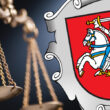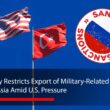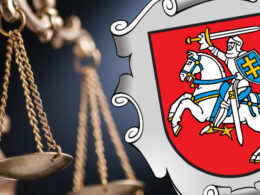Despite the fact that Russians are under pressure from Western sanctions, 70% of Russia’s population supports Putin’s regime. This trend is currently prevalent there. How did it happen that the average Russian lives with such cognitive dissonance? Why is it still “important” for Russians to support Putin’s policies?
This is not a completely correct question. The Russians are not under sanctions. The economy of the Russian Federation is currently under sanctions. Russia’s economy is concentrated in Putin’s hands and subordinate to Putin’s oligarchies.
Russia’s economy has been developing for more than twenty years thanks to the active political and financial support of many Western countries. Now this support is disappearing. Putin sees the current situation as a conflict between him and former Kremlin business partners in the West who have deceived Russia. The Russian government remains convinced that the constant talk of human rights and the values of a free world is just unnecessary demagoguery that stands in the way of real business.
To make it easier to understand: the population of present-day Russia has the same patterns of behavior as the population of the Soviet Union. Putin provided the Russians with the same old algorithm of self-identification – and they gladly accepted it. They have given up freedom in exchange for relative economic stability, and the quality of such stability does not matter to them.
Russians, except for Moscow and St. Petersburg, live in absolute poverty and isolated from the general economic reality of their country. Their worldview and current life circumstances do not seem to be traumatic for them.
For twenty years, Putin’s power has been based on the cult of his personality. His leadership style combines images and examples of the eastern monarch and tribal leader. There is nothing European in it. His actions are reminiscent of Muammar Gaddafi and Saddam Hussein.
What is it like to be a citizen of an authoritarian state, such as Russia, North Korea or Nazi Germany? What are the mechanisms for protecting human dignity and can they be turned off in certain circumstances? How long will it take?
Most European states were authoritarian at the beginning of their history. Democracy, as we understand it today, is a young historical phenomenon. Authoritarian regimes, despite great cultural differences, have a similar feature: they reconstruct the algorithm of the past. They speak of the strength and greatness of their countries, with rather weak arguments to justify themselves. The basis of Russia’s support for totalitarian regimes – and Putin’s regime is totalitarian, not authoritarian – is a combination of the pleasant feeling that the whole world is afraid of Russia.
Even if you are nobody, everyone in the world is afraid of you, despite your limited personal and professional achievements. You have gained power and authority over the whole world with very little effort: you have only supported your reliable tyrant. How can you not love a person who has just provided you with such a high level of self-esteem?
Putin is often compared to Hitler. Yes, Hitler’s propaganda machine and the motivation to support it have many similarities to Russia. But while Hitler and Himmler cultivated a lack of human conscience in the behavior of the SS and the Gestapo, Putin obliged all of Russia to behave like the SS and the Gestapo combined.
This led to the complete loss of two or three generations of Soviet people. Future cooperation with the West seems possible only for young Russians, although it will not be easy. At the same time, it is important to take into account the very significant social difficulties that have arisen and continue to exist in Germany after the fall of the Berlin Wall.
What can justify a Kremlin nuclear strike? What can unleash the spiral of nuclear violence? The possibility of a Russian nuclear attack is an integral part of Putin’s reputation in Russian society. This was the case with the leaders of the Soviet Union. Putin is not interested in a world where Russia does not live up to its vision. Putin is very similar to Stalin and Hitler in their paranoia about world domination. Putin does not believe that the West may not be afraid of him. It can only be stopped by a demonstration of a united and coordinated international force, as Khrushchev was stopped during the Caribbean crisis.
Source: LB.UA, by Oleh Pokalchuk, social and military psychologist, expert in PsyOps and counter-intelligence defense








